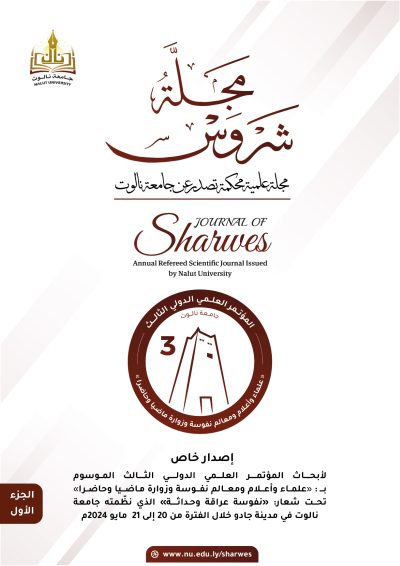شاهد عيان على سيرة عالم وباحث آباضي "د. عمرو خليفة النامي أنموذجا"
DOI:
https://doi.org/10.26629/v54avz58Keywords:
Amr Al-Nami, prisons, Libyan University, Cambridge University, Contemporary, AbadiaAbstract
Dr. Amr Al-Nami is one of the well-known Islamic figures in Libya and the Islamic world. He was born in the city of Nalut in 1942 AD and grew up in its plains, valleys, mountains, plateaus, and deserts. This nature gave him toughness, strength and courage. He was raised in a conservative family committed to the teaching of Islamic Religion and lived like other Libyan families at that time, relying on agriculture and grazing. In the summer, the family moved to the outskirts of the city (Al-Sharaf), and in winter and returned to move between the city and umm Al-Dhiyab. He learned the Qur’an at the beginning of his life in the Kuttab (Sidi Khalifa Mosque and Gnan Mosque) at the hands of distinguished sheikhs, such as Sheikh Ali Yahya Muammar and the jurist Masoud Salem Gnan and other sheikhs of the city. Then he studied primary school in the city of Nalut and middle /secondary school in Gharyan. During his studies, he was distinguished and intelligent among his peers. He used to organize cultural and artistic exhibitions alone and with his colleagues. Then he moved to the university stage with the beginning of the opening of the Libyan University in 1955 AD to join the Faculty of Arts at the University of Benghazi / Libya. He was distinguished at this stage and chosen as a teaching assistant and sent to Egypt to prepare for a master’s degree study, but due to the circumstances that Egypt experienced during that period, he returned to Libya and sent back to United Kingdom to prepare for his master’s and doctoral degrees at the University of Cambridge. His doctoral thesis was on (Studies on Ibadism), after which he returned to Libya as a member of teaching staff at the College of Arts in Benghazi University. He wrote many books, poems, and articles during and after the period of completing his studies. Due to his political positions, he was removed from teaching in several ways, so he was sent to America. Then Japan, after which he was completely removed from teaching after Gaddafis speech in 1973 AD, and he was imprisoned immediately after his speech and activities in Libya. The imprisonment periods continued several times and the last of them was in a psychiatric hospital in Tripoli. His life ended, according to my belief, during the events that Libya witnessed in 1984 AD, with the entry of an armed group affiliated with the National Front for the Salvation of Libya into the country entering across the Tunisian border.








